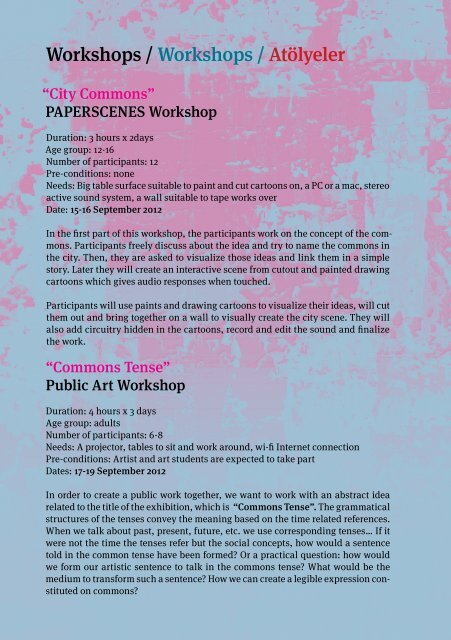© 2012 | amberTXT / BIS ISBN 978-605-88807-7-1
Untitled - Back - Sabancı Üniversitesi
Untitled - Back - Sabancı Üniversitesi
- No tags were found...
Create successful ePaper yourself
Turn your PDF publications into a flip-book with our unique Google optimized e-Paper software.
Workshops / Workshops / Atölyeler<br />
“City Commons”<br />
PAPERSCENES Workshop<br />
Duration: 3 hours x 2days<br />
Age group: 12-16<br />
Number of participants: 12<br />
Pre-conditions: none<br />
Needs: Big table surface suitable to paint and cut cartoons on, a PC or a mac, stereo<br />
active sound system, a wall suitable to tape works over<br />
Date: 15-16 September <strong>2012</strong><br />
In the first part of this workshop, the participants work on the concept of the commons.<br />
Participants freely discuss about the idea and try to name the commons in<br />
the city. Then, they are asked to visualize those ideas and link them in a simple<br />
story. Later they will create an interactive scene from cutout and painted drawing<br />
cartoons which gives audio responses when touched.<br />
Participants will use paints and drawing cartoons to visualize their ideas, will cut<br />
them out and bring together on a wall to visually create the city scene. They will<br />
also add circuitry hidden in the cartoons, record and edit the sound and finalize<br />
the work.<br />
“Commons Tense”<br />
Public Art Workshop<br />
Duration: 4 hours x 3 days<br />
Age group: adults<br />
Number of participants: 6-8<br />
Needs: A projector, tables to sit and work around, wi-fi Internet connection<br />
Pre-conditions: Artist and art students are expected to take part<br />
Dates: 17-19 September <strong>2012</strong><br />
In order to create a public work together, we want to work with an abstract idea<br />
related to the title of the exhibition, which is “Commons Tense”. The grammatical<br />
structures of the tenses convey the meaning based on the time related references.<br />
When we talk about past, present, future, etc. we use corresponding tenses… If it<br />
were not the time the tenses refer but the social concepts, how would a sentence<br />
told in the common tense have been formed? Or a practical question: how would<br />
we form our artistic sentence to talk in the commons tense? What would be the<br />
medium to transform such a sentence? How we can create a legible expression constituted<br />
on commons?<br />
112


